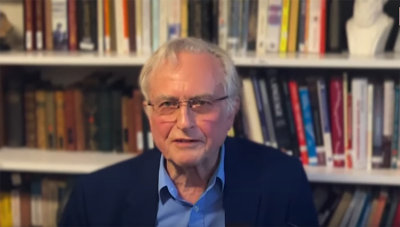Traipsing in the ‘cultural Christianity’ of Richard Dawkins

What is “Cultural Christianity”? It seems difficult to define without paradox. Can it be defined by the trends of a particular culture? How is “Christian” understood? A culture’s thinking may provide answers but what makes them offer anything special to humankind? That seems to be the paradox: it offers a sense of ‘Christian’ without it being Christian. “Cultural Christianity” can freely reinterpret the Christian faith to accommodate cultural trends, one today, another tomorrow, and yet another next week. So, what was the point of the world’s most famous atheist when he recently complained about the decline of “cultural Christianity” in the UK?
During Easter, Richard Dawkins said in an interview, “I call myself a cultural Christian ... I’m not a believer, but there’s a distinction between being a believing Christian and a cultural Christian. And so, I love hymns and Christmas carols, and I sort of feel at home in the Christian ethos.” The sobriety of Dawkins is commendable, and we certainly witness a tone far removed from the iconoclasm of The God Delusion. There definitely seems to be an experience of something about Christianity, and it’s intriguing to witness a staunch atheist speak of feelings towards “the Christian ethos.”
Dawkins seemed to embrace something about Christianity while declining belief in its actual faith. He mentioned that he “loves hymns and Christmas carols.” What does he love about them? Most lyrics are theological, Christological, and doxological. Does he have an inner feeling that desires Christian faith but is suppressed by empirical demands? The feeling to “love hymns and Christmas carols” is not uncommon for a human being. Is the sentiment compelled by “believing Christianity” and substituted by artificial exercises?
So, when Dawkins lamented the decline of “cultural Christianity” in the UK, what is the antidote that would benefit the UK if the trend reversed? I believe the “cultural Christianity” of Dawkins could pass as a tenet of Secular Humanism. Even a humanist could identify as a “cultural Christian” without accepting Christian faith. It becomes a preferred identity that could appreciate a moral ethos of “love your neighbor” teachings of Christianity and participate in an occasional hymn singing to get the feeling of something.
The real antidote for humankind’s predicaments is what distinguishes “a believing Christian,” particularly belief in grace, repentance from sin, and regeneration. Jesus said, “I am the door. If anyone enters by me, he will be saved and will go in and out and find pasture” (John 10:9). This is the door that allows entrance into the home of Christianity. Through this door, a believer receives grace and experiences the joys of sins forgiven with a peaceful relationship with God. This is the real “distinction.” So then, I wonder what makes Dawkins believe that his identity as a “cultural Christian” should be preferred over that of “a believing Christian?”
As a believer, I submit that the Gospel is a hard message that makes everyone uncomfortable. It certainly can provoke antagonism from people. That is why believers are commanded to be “wise as serpents and innocent as doves” (Matt. 10:15). The Gospel is an all-or-nothing message. For a contemporary natural person, it’s simply not part of the cultural way of thinking. Yet the Gospel continues to invite people to experience the grace of God, and regeneration provides a substantially new manner of appreciating the Savior.
Humanity is the ultimate object of our interpretations of the Christian faith. Whatever question one asks about the Lord Jesus, the object of the answer will always be the human mind, heart, and will. This is why inquirers can become contrarian and often emotional, as answers provide implications that challenge lifestyles. “Cultural Christianity” can provide artificial fillers that suit one’s preferences, but I believe it’s misleading and not a bona fide worldview.
To amplify the real distinction and eliminate paradox, a questioner should consider sympathetically what the High Priest of Christianity taught. What I mean by sympathetically is genuinely seeking to understand what Jesus Himself wanted humanity to know. A seeker can always disagree, but at least it will be an intelligent disagreement. The distinction between “cultural Christianity” and Christian faith should reveal a clear understanding of both so that people can decide intelligently.
Jesus began His ministry by uttering this initial directive, “repent and believe in the Gospel” (Mark 1:14). He then taught humankind that, “the gate is narrow and the way is hard that leads to life, and those who find it are few” (Matt. 7:13). This message shocks cultural thought, but makes people feel something about the Lord Jesus. As He said, “The words that I have spoken to you are spirit and life. But there are some of you who do not believe” (John 6:63-64). A natural person considers the message but evaluates it as too counter-cultural, and not realistic to how modern people should live their lives. Nevertheless, the convictions are real and so is the call to repentance. Thus cultural thought embraces an “appearance of godliness, but denying its power” (2 Tim. 3:5).
Perhaps “Cultural Christianity” is not all meaningless, but I am still thinking about whether Dawkins has any common ground with the Christian faith. Would he feel comfortable standing around a piano at Christmas time with me and my believing Christian friends and singing, “Joy to the World”? Would he be open to joining a Bible study on the Sermon on the Mount with evangelical scholars? When someone says they “feel at home” with something there is usually some willingness to participate in that “home.” Nevertheless, I can appreciate these sentiments of Dawkins towards Christianity, even though his interpretation borrows what he likes but can’t offer an antidote of his own.
Christian faith remains an intelligent worldview as it demonstrates competent engagement with reality and offers a unique antidote to humanity’s predicaments, one which people of all socio-economic, educational, and political groups continue to experience. The grace of God is beautiful as it doesn’t discriminate against anyone. The Gospel continues to prod people by the Spirit to enter “the Door.” This prodding is felt by many, but unfortunately, cultural thought often makes the decision for them and so they settle with “cultural Christianity.”
Marlon De Blasio is a cultural apologist, Christian writer and author of Discerning Culture. He lives in Toronto with his family. Follow him at MarlonDeBlasio@Twitter



























